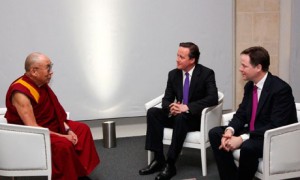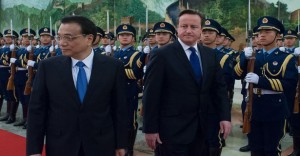British Prime Minister David Cameron has undertaken a three day trade mission to China, in an attempt to mend ties with the country.
China had refused UK visits for over a year, after the Prime Minister and Deputy Prime Minister Nick Clegg, met the Dalai Lama in May 2012 in London. The purpose of the visit was to establish investment for nuclear power and a new high speed rail line in the UK, as well as pushing for free trade between China and the EU. The Prime Minister was accompanied by over 100 business people, and £5.6bn in deals were signed. China agreed to meet Cameron following his statement in May 2013 that the UK “does not support Tibetan independence”, and views Tibet as part of China. A source at No10 Downing Street has said “This visit is forward-looking. It is about the future and how we want to shift UK-China relations up a gear. We have turned a page on the Dalai Lama issue.”
A spokesman for the Free Tibet campaign has commented that Cameron is not adhering to Britain’s ethical foreign policy; “He raised human rights in Sri Lanka – he must show Britain’s principles are not dependent on hosts’ wealth”. He continued “China is not a rock: it does change and it will change its policy on Tibet if world leaders have the courage to hold it to account. Mr Cameron stands up for human rights in Sri Lanka and the right of self-determination in the Falklands. This is his chance to show China and the world that Britain stands up for justice everywhere.”

David Cameron and Nick Clegg angered China by meeting the Dalai Lama at St Paul’s Cathedral, London in May 2012
Photo: PA
Despite Cameron’s failings to approach the human rights issue, he did question the Chinese on their media policy, after a high profile Bloomsberg journalist was banned from the press conference. Cameron commented that this was “completely inappropriate” at such a high profile event. He also challenged the Chinese leadership to do more to open the cyber-security system in the country, which the Chinese Prime Minister Li said he was prepared to discuss.
During the visit, the BBC shined the spotlight on Tibet. BBC China correspondent Damien Grammaticas sneaked into the country where he interviewed Tibetans about the real situation under Chinese rule and wrote an in-depth report of his findings covering self-immolations, media blackouts, mining and oppression.





 Print
Print Email
Email